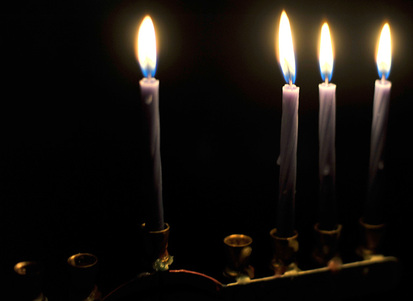
Originally, Chanukah was a nationalistic celebration of the Maccabees military victory over the armies of King Antiochus IV of the Seleucid Empire. It celebrated Israel's return to sovereignty under the rule of the Hasmonean Dynasty.
The rabbis of Talmud were the first to redefine Chanukah. They downplayed the story of military victory and promoted Chanukah as a celebration of God's power (not the power of the cruel Hasmoneans, whom they hated). They promoted a story about a miracle – one involving a cruse of oil – that occurred when the Temple was rededicated at the end of the Maccabees' war.
The transformation of Chanukah has not stopped since that time. As we prepare to enter the Festival of Lights, we would do well to separate fact from fiction. Here, then are three lies we tell about Chanukah and three truths that we ought to tell:
The Lies
• Chanukah is about fighting the threat of cultural assimilation. It is such a seductive storyline. The villainous Seleucid Empire tried to force their evil Greek ways upon the innocent Israelites until brave Judah Maccabee vanquished the Hellenizers and purified the Israelites from idolatry. It just happens not to be true. The book of Maccabees says that the Israelites celebrated their triumph with garlands made of ivy – a Greek symbol of celebration that is identified with the god Dionysus. That says a lot. The Maccabees' fight was not about assimilation – the Maccabees themselves were assimilated – their fight was about nationalism and power, not cultural identity.
• Judah Maccabee was a crusader for freedom of religion. That statement is true only if you add two words to the end of the sentence: "…for himself." The Maccabees today would be regarded as religious zealots. As much as they fought a military war, they also fought a war for religious domination. "Freedom of religion" to the Maccabees meant freedom to kill Jews who adopted Greek worship.
• Chanukah is the Jewish answer to Christmas. The funny thing is, not even the Christians are sure they want Christmas. Why should we? Already in the 18th century, Puritan Christians wanted to ban the observance of Christmas because it was too materialistic. Most of my Christian clergy friends today bemoan the way that Christmas has been transformed into a shopping frenzy. Far from a time for families to come together and enjoy the simple virtues of peace and love, Christmas has turned into a whole month that teaches children some very un-Christian values – like avarice and greed. Rather than trying to create a Jewish Christmas, we should be happy not to have one in the first place.
The Truths
• During the eight days of Chanukah we add light to some of the darkest days of the year. Across the world, many cultures have rituals in which they light up the night around the time of the Winter Solstice. Chanukah is one of these rituals. During these days, we remember that, even in the darkest times, there is the hope and promise of light. We celebrate Chanukah with our families as a ritual of remembering to hope even in times of despair.
• Chanukah is more a celebration of the future than it is of the past. In the Talmud, the rabbis argued about whether one should light eight lights on the first night and reduce them to one on the last night, or if one should start with one light on the first night and increase them to eight on the last night. (I don't need to tell you which side won.) Those who wanted to light eight lights on the first night used history as their argument. They said that, when the Temple stood, it had been the practice to sacrifice thirteen oxen on the first day of Sukkot and to reduce them each day for the eight festive days; the Chanukah lights, they argued, should follow historical precedent.The rabbis who wanted to start with one light and increase each day based their argument on the idea that holiness only increases over time and never decreases. The future is always brighter than the past. Chanukah is about looking forward, not looking back.
• Chanukah is not about presents; it's about the presence of spirituality in our lives. The rabbis chose a special haftarah to be read on the Shabbat that falls on during Chanukah. The passage is from the prophet Zechariah and it includes his vision of the golden Menorah that stood in the ancient Temple. In the passage, an angel tells the prophet, "'Not by might of soldiers, nor by brute force, but only with My spirit,' says Adonai of Hosts." At this time of year, when everything around us is so focussed on sales and spending, it is profoundly comforting to remember that the real truth of our lives has little to do with how many things we have or how much power we have accumulated. The real measure of our lives is in remembering the spirit that lies within us and connects us to each other and to the sacred.
Other Posts on This Topic:
What is Chanukah?
The Miracle of the First Day of Chanukah

 RSS Feed
RSS Feed
